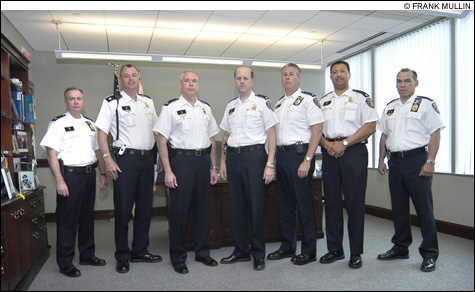
A NEW APPROACH: Esserman [fourth from left] says the city’s success stems from collaborative efforts between the police and an array of other groups. |
The killing season in America is about to begin.
Every year, as summer approaches in US cities, violent crime spikes as predictably as the arrival of Memorial Day cookouts. The bloodshed is well under way in some places, including Boston, which after enjoying remarkable success in reducing violence in the late 1990s, has recorded 20 murders so far this year, after 75 last year, mostly in the city’s poorest neighborhoods.
Providence, by contrast, has bucked a trend in which the number of violent crimes is increasing in many American cities. There were 11 murders in the city in 2006 — half the number of the previous year — and the fewest since 1971. And while Providence this week experienced its third homicide of 2007, its number of major crimes dropped 30 percent from 2002 to 2006, according to police figures, and the most serious violent crimes fell by 27 percent over the same period.
While the police and others monitoring the situation remain guarded, knowing how things could quickly change for the worse, Providence’s collaborative, multi-faceted approach to reducing violence has attracted interest from other communities around New England, including Boston, New Haven, and New Bedford. (The topic is slated for discussion as part of a conference May 21 and 22, featuring George Kelling, co-author of the “Broken Windows” theory, at Roger Williams University in Bristol.)
The success is all the more striking given how Providence, according to US Census data, is tied with New Orleans as the third-poorest city for children in America.
The change reflects a definite transformation in the Providence Police Department: from a problem-plagued, change-averse force in the waning years of Buddy Cianci’s rule into a more publicly responsive agency that embraces contemporary practices, is willing to consider unconventional ideas, and engages in productive relationships with a slew of partners — including social clinicians who assist children exposed to violence, and 13 street workers who fan out across the city to try to prevent it from happening in the first place.
In contrast to the simplistic rhetoric of tough-on-crime politics, Providence is demonstrating how complex solutions can help to ameliorate complex problems.
Now, the big question is whether the city can sustain its success in having reduced violence — and for how long.
The summer ahead
Rhode Island’s capital has the ingredients that could fuel an eruption: large parts of the city are poor, and good jobs are hard to find, particularly for people with marginal skills or little education. Guns are widely available, and gangs and gang culture remain attractive to the rising generation in Providence’s middle and high schools.
“We’re under no illusion that you can buck the trends forever,” says Teny Gross, executive director of the South Providence-based Institute for the Study & Practice of Nonviolence, whose street workers have been credited with helping to reduce violence since the program began in 2003.
Since so much is beyond the control of those involved with the situation, Gross says, they must ask, “What do we have control over? Where can we make a difference?”
It is through a variety of these deliberate efforts that progress has been made. As part of a strategy to keep a lid on things this summer, Gross and Police Chief Dean Esserman recently sent 4000 letters, asking members of the Greater Providence Chamber of Commerce to help create 60 summer jobs for Providence teenagers.